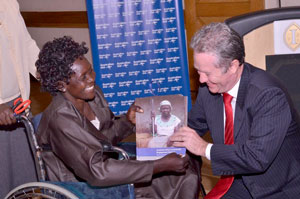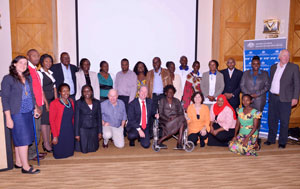The Australian High Commissioner to Kenya, Geoff Tooth, has launched the 2012-13 Australia Africa Community Engagement Scheme (AACES) Annual Report at a breakfast event in Nairobi, attended by the local NGO partners implementing AACES.
AACES is a five year (2011-16) $90 million partnership program between the Department of Foreign Affairs and Trade, ten Australian non-government organisations (NGOs) and their local partners in Africa. It delivers community programs in 11 African countries (Ethiopia, Ghana, Kenya, Malawi, Mozambique, Rwanda, South Africa, Tanzania, Uganda, Zambia and Zimbabwe) to improve the lives of marginalised people, particularly women, children, people with disability and people vulnerable to disaster.
AACES NGOs work with communities to build on their existing strengths, giving them the space to drive the change they want to see.
In its second year, the unique partnership program is on track to meet its objectives. AACES reached thousands of people in need to improve agricultural productivity and support access to maternal and child health, and water and sanitation services. The program supports innovative partnerships with the private sector, helping extend the reach and quality of services to communities. AACES also aims to improve women's economic participation and empowerment, including through micro-finance programs.
Key achievements during 2012-13 included:
- More than 80,000 people gained access to maternal and child health programs: 23,400 children received life-saving vaccines and over 10,000 babies were delivered safely.
- More than 30,000 households adopted new and improved agricultural technologies that will increase agricultural productivity.
- More than 64,000 additional people accessed safe and sustainable water: 47,000 people accessed appropriate sanitation and 50,000 people learned about good hygiene.
Mr Tooth reiterated the importance of community-based projects in Africa, highlighting how Australian Government support to NGOs is improving peoples' lives and delivering more opportunities to the most vulnerable. He also noted the significant work AACES NGO partners are doing to ensure people with a disability benefit equally from development assistance so that no one is left behind.
This year's report focused on the important work NGOs are doing to ensure people with a disability are included in and benefit equally from AACES projects. This focus is timely as Australia has reaffirmed its commitment to people with disability in its international development agenda.
The efforts of AACES partners are helping to increase access to services and participation in decision-making to improve living standards and the status of people with disability. AACES is also raising awareness about the benefits of involving people with disability in the community and meeting their needs. Anecdotal evidence in the report demonstrates the personal impact of these programs and the wider behavioural change occurring as a result, which continues beyond the life of the program.
The program's strong partnership approach has encouraged learning and sharing of experiences in a broad range of areas, including disability-inclusive development. This culture of collaboration, now entrenched in AACES, is a key element of an effective program delivering results.


